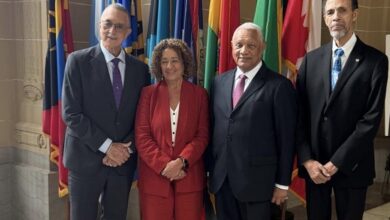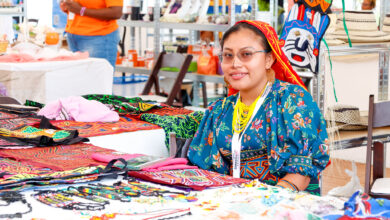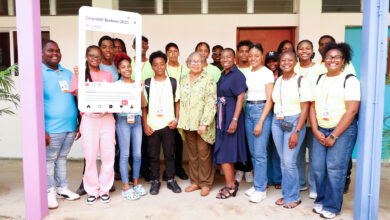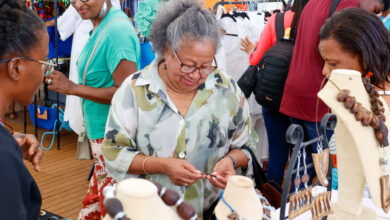(CARICOM Secretariat, Turkeyen, Greater Georgetown, Guyana) Caribbean Week of Agriculture (CWA) was formally opened on Wednesday with a chorus of calls for coordinated efforts to firmly tackle the huge food import bill and ensure food security in the Region.
The calls were made at the ceremony at the Sir Vivian Richards Stadium, St. John’s, Antigua.
The Eleventh CWA, which concludes on Friday following a special meeting of the Council for Trade and Economic Development (COTED), is being held under the theme `Celebrating Youth and Gender in Caribbean Agriculture, Each Endeavouring, All Achieving’.
Delivering the feature address at the Eleventh CWA at the Sir Vivian Richards Stadium in St. John’s, Antigua, the Honourable Baldwin Spencer, Prime Minister of Antigua and Barbuda, referred to the high food import bill and stressed that the Region’s people had to adjust the way they lived in order to reduce that cost.
“Trends in food producing nations, for example, suggest that we would need to produce considerably more to meet the demands of a fast-growing population. Recent analyses and estimates indicate that about one billion people throughout the world are suffering from chronic hunger and malnutrition,” Prime Minister Spencer said and pointed out that given the current rate of population growth, world food production needed to increase significantly.
The situation, he said, was exacerbated by issues such as climate change, increased prices for food and inputs, natural disasters, and dwindling resources.
Food and nutrition security therefore was one of the more critical concerns for everyone, the Prime Minister said.
He added that it was necessary for the Region to produce considerably more than it was currently doing to meet the demands of a fast-growing populace.
Food security, he told the sizeable audience, was critical to “all of us”, and added that “we cannot stop producing food.”
For Ambassador Irwin LaRocque, Secretary-General of the Caribbean Community (CARICOM), a regional approach to agriculture production was “the obvious solution to addressing our high food import bill and our food and nutrition security.”
“More of our governments are coming forward with concrete programmes aimed at increasing agricultural output. More recently, we heard of the initiative by the government of Trinidad and Tobago to launch a Food Security Facility, the aim being to utilize land available in Guyana to produce a range of food crops. This is a prime example of what can be done to collectively use the Region’s resources to engage in production integration and to increase the Region’s food supply,” he said at the opening ceremony.
He pointed out that while it was not feasible to produce all our food, it was crucial to target those categories of food imports that could profitably be produced in the Region.
“A large segment of these imports go directly into tourism and the growing fast food sector. This is one area that we should be able to target, but it requires that we arm ourselves with detailed information on the products involved, the form in which they are imported and the cost factors that have to be addressed,” the Secretary-General said.
He alluded to the “encouraging signs” of progress in penetrating the tourism and fast food industries, particularly in products like poultry, and pointed out that there was also scope to introduce more root crops into those sectors
“…but to do that successfully, we have to develop the capacity to produce and package this product and provide them in exactly the form in which they are required, Ambassador LaRocque said.
At the special COTED meeting, agriculture ministers will consider a draft plan of action for strengthening the linkages between agriculture and tourism, and the Secretary-General expressed the hope that it would be the start of a more intensified regional approach to ensuring that the agricultural sector benefitted to the maximum extent from the significant annual tourism expenditure.
“The fact is”, he pointed out, “that agriculture is a business much like any other. If it is profitable and dynamic it will attract new entrants. Our challenge then is to provide the supportive infrastructure and information that will assist those in the sector, and those wishing to enter, to operate on a profitable basis.”
Also speaking at the opening ceremony was Dr. Richard Harrison, Chairman of the Board of Directors of the Caribbean Agricultural Research and Development Institute (CARDI) who endorsed the call for all stakeholders in the agriculture sector to work together in a focused fashion.
The opening ceremony was also addressed by Mr. Michael Hailu, Director at the Technical Centre for Agricultural and Rural Cooperation; Dr. Victor Villalobos, Director-General, Inter, American Institute for Cooperation on Agriculture (IICA); Dr. Raul Benitez, Assistant Director General and Regional Representative for Latin America and the Caribbean, Food and Agriculture Organisation (FAO).





